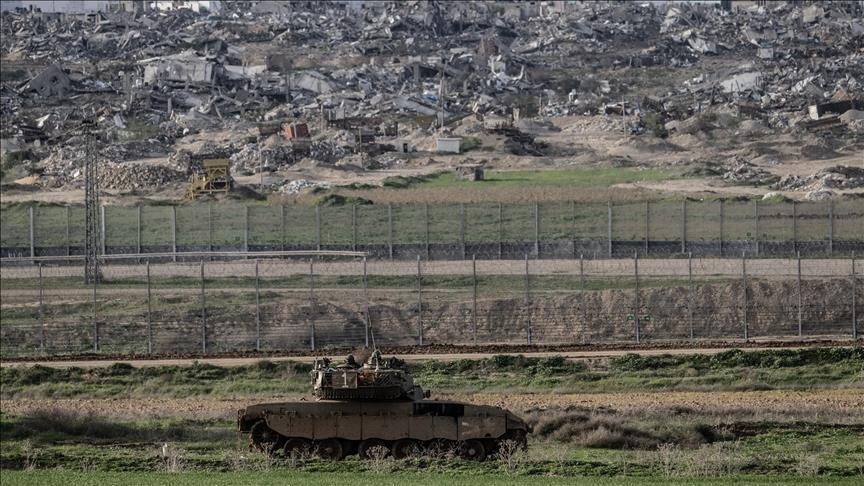Philadelphi Corridor: ‘Israel violating Egypt peace treaty to cut off Gaza from world’
Israel is effectively in violation of 1979 peace treaty with Egypt, international lawyer Djaouida Siaci tells Anadolu

- Israeli move is a ‘game changer’ militarily, politically and for humanitarian situation as ‘Gaza is effectively cut off from the rest of the world,’ says Siaci
- Israel showing the whole world it is ‘continuing strong-arm policy of a full siege on Gaza,’ says Sherif Mohyeldeen, non-resident scholar at Carnegie Middle East Center
ISTANBUL
Israel’s move to seize the Rafah crossing has raised concerns over the fate of the Philadelphi Corridor, a demilitarized buffer zone running along the Gazan-Egyptian border.
The corridor is considered a strategically important route in terms of Israel’s control over cross-border movement of people and goods.
On Tuesday, for the first time since 2005, Israeli forces moved into the eastern side of the corridor. The military put out videos showing tanks rolling through the Rafah checkpoint and advancing through the corridor, while soldiers tore down Palestinian flags to replace them with Israeli ones.
Experts say this is a violation of a 1979 peace treaty between Israel and Egypt, which Tel Aviv has willingly done as part of its objective to impose a “full siege” on Gaza.
The treaty followed the Camp David Accords signed by Egyptian President Anwar Sadat and Israeli Prime Minister Menachem Begin in 1978.
It ended Israel’s occupation of the Sinai Peninsula and reopened the Suez Canal, and set up the 14-kilometer (8.69-mile) corridor as a buffer zone controlled and patrolled by Israeli forces.
After Israel’s withdrawal from Gaza, control of the Palestinian side went to the Palestinian Authority, followed by Hamas, when it came to power in the enclave in 2007.
“If either Israel or Egypt sent troops across the recognized border, that would be a blatant violation of the treaty. By taking control of the Rafah border crossing, Israel is effectively in violation of the terms of the treaty,” Djaouida Siaci, an international lawyer specializing in cross-border disputes and criminal investigations, told Anadolu.
Why does Israel want the corridor?
Since last October, Israeli Prime Minister Benjamin Netanyahu has reiterated on several occasions that he wants Israel to take back control of the Philadelphi Corridor, a move that would cut off Gaza from Egypt.
He claims that Israel would not be able to defeat Hamas in Gaza without taking over the corridor.
The historic purpose of the corridor has been to stop movement of people and materials from Egypt to Gaza, where Israel has enforced a crippling land, sea and air blockade for decades.
“The Israelis view the corridor as important in terms of being used as a buffer zone to limit the smuggling,” said Siaci, adding that they had threatened many times that they would take control of it.
After Tel Aviv’s latest move, she believes the corridor is “effectively 100%” under Israeli control.
Sherif Mohyeldeen, a scholar on cross-border issues, views this as part of Israel’s “full siege” on Gaza, where it has now killed nearly 35,000 Palestinians and injured more than 78,200 since last October.
“By taking control of this corridor, Israel is continuing to show to all the regional players, to the people of Gaza, and to the whole world that it is continuing the strong-arm policy of a full siege on Gaza,” he told Anadolu.
The Israelis are “trying to squeeze the Palestinians in Rafah” from all sides, he said, adding that this region in the south was the only one that was so far not fully under Israeli control.
Israel is definitely violating the peace treaty with Egypt by sending tanks and troops into the corridor, and by invading the Rafah checkpoint without Egyptian consent, added Mohyeldeen, a non-resident scholar at the Carnegie Middle East Center.
‘Gaza effectively cut off from the world’
Israel taking control of the Rafah border crossing and moving into the Philadelphi Corridor is a “game changer,” not just militarily and politically, but also from a “humanitarian point of view,” said Siaci.
“It is significant because Gaza is effectively cut off from the rest of the world,” she asserted.
“This was the only way out for people who are sick, for people who need medication, for people who need food … and they are effectively cut off from the world.”
She said it was appalling to see all of this play out “to a deafening silence of the international community.”
Geopolitical analyst Ahmed Maher warned that Israel’s latest move has added another precarious twist to the devastating war on Gaza.
“The (Rafah) crossing, which is the lifeline for Palestinians in Gaza, is being used as a political tool by the Israeli army,” he told Anadolu.
“This policy could be tantamount to collective punishment of civilians, and non-combatants in particular, as they are always the weakest link and find themselves the direct object of this war.”








